Fri 13 Jan 2023
GROVER AVENUE BLUES: The 87th Precinct TV Series, Part I, by Matthew R. Bradley.
Posted by Steve under Reviews , TV mysteries[14] Comments
The 87th Precinct TV Series, Part One
by Matthew R. Bradley.
Under the byline Evan Hunter, legally adopted in 1953, Salvatore Albert Lombino (1926-2005) was the original author and/or screenwriter of such films as The Blackboard Jungle (1955), adapted by director Richard Brooks; John Frankenheimer’s The Young Savages (1961); and Alfred Hitchcock’s The Birds (1963). His scripts and stories were seen on Alfred Hitchcock Presents, The Kaiser Aluminum Hour, and Bob Hope Presents the Chrysler Theatre.
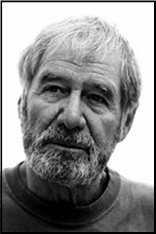
As Ed McBain, he was the acknowledged master of the police procedural, his 87th Precinct mysteries comprising 55 books over half a century, possibly inspiring Hill Street Blues. Cop Hater, The Mugger, and The Pusher (all 1956) were filmed between 1958 and 1960; the following year, NBC’s 87th Precinct debuted. Robert Lansing, carried over from The Pusher (1960), played Det. Steve Carella, and later Gary Seven in the Star Trek spin-off manqué “Assignment: Earth†(3/29/68).
In a 1989 introduction to Cop Hater and afterword to The Pusher, McBain discussed his innovation of a “conglomerate hero in a mythical city…[that] was like New York but not quite New York,†with analogs for each borough. “[O]ne cop can step into the spotlight in one novel, another in the next novel [as when Carella is honeymooning in The Mugger], cops can get killed and disappear from the series, other cops can come in, all of them visible to varying extents…†The show standardized the duty roster to Carella and three colleagues, replacing “Isola†with its model, Manhattan.
Ron Harper — later astronaut Alan Virdon on Planet of the Apes — co-starred as Bert Kling, promoted from patrolman after cracking a murder in The Mugger. The landlord on Three’s Company, Norman Fell played sardonic family man Meyer Meyer, per McBain “a Jew whose father had a hilarious sense of humor.†Immortalized in Ed Wood’s Plan 9 from Outer Space (1957), Gregory Walcott was the sanitized Roger Havilland, whose prose original tried to break up a street fight; broken in four places by a lead pipe, his arm had to be rebroken and reset, said ordeal rendering him a violent cynic.
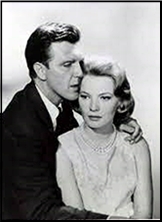
◠Of the 30 episodes, 11 were based on McBain’s works, including all nine novels following The Pusher; “The Floater†(9/25/61) was adapted from The Con Man (1957), previously dramatized on Climax! as “The Deadly Tattoo†(5/1/58). The 87th Precinct premiere was written by Winston Miller, who went on to co-produce the series with Boris D. Kaplan, while Alfred Hitchcock Presents and Thriller workhorse Herschel Daugherty directed the first and last episodes. This introduced Carella’s deaf-mute spouse, Teddy (Gena Rowlands), and medical examiner Dr. Tom Blaney (Paul in the novels; Dal McKennon).
Robert Culp guest-stars as serial killer Curt Donaldson, who selects prospective wives with personals ads, gains control of their money, and dispatches them with arsenic after “signing his work†with distinctive tattoos. Teddy plays a prominent role, following Curt and his latest victim from a tattoo parlor to Pier 7, where she is almost killed before the squad arrives to save both women. Havilland provides a vastly toned-down account of McBain’s transformative trauma, while the lethally affable Culp was followed by such up-and-comers as Dennis Hopper, Leonard Nimoy, Robert Vaughn, and Peter Falk.
◠McBain personally scripted “Lady in Waiting†(10/2/61) and “King’s Ransom†(2/19/62); adapted from Killer’s Wedge (1959), the former marked Rusty Lane’s debut as Desk Sergeant Dave Murchison. Virginia Colt (Constance Ford) holds the disarmed Meyer, Kling, and Havilland hostage at the station house — located, per McBain, on Grover Avenue, facing Grover Park — with a bottle of alleged nitroglycerine, vowing to kill Carella on arrival for sending her safecracker husband to prison, where he has died.
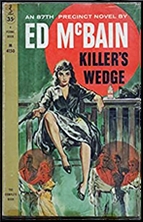
Stumbling in, clerk Alf Miscolo (Miguel Landa) is shot, concealed, and denied a doctor as Roger turns off the fan, closes the windows, and cranks up the thermostat, prompting Virginia to remove the coat in which she pocketed his gun. Teddy arrives as Roger goes for his weapon, and Meyer pretends she is a complainant, but Virginia recalls reading of Mrs. Carella’s disability, and threatens her before being subdued in a scuffle by Roger and Bert. Delayed by a flat, Carella is baffled by the Bomb Squad’s call to say, “it was.â€
Dropping Teddy’s pregnancy and the B story of Steve’s locked-room “suicide,†McBain nicely depicts the squad’s ingenious efforts at extrication, defeated by stupidity. Bert slyly tries to summon help while answering a call from the precinct commander, who is oblivious to his hints; assuring a clueless Dave that the shot he heard was accidental, Meyer says he’ll see the sarge “forthwith,†police jargon for “report immediatelyâ€; Meyer is pistol-whipped by Virginia when she listens in on an imprudent call from Headquarters after two boys find a note he slipped out the window. McBain also retains his sympathetic portrayal of a Puerto Rican immigrant arrested for slitting the throat of a man who “got funny†with her.
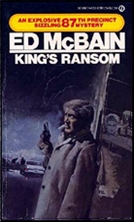
◠“King’s Ransom†was based on McBain’s 1959 novel, filmed by Akira Kurosawa as Tengoku to jigoku (Heaven and Hell, aka High and Low; 1963). Businessman Douglas King (Charles McGraw) faces an ethical dilemma when his chauffeur’s son, Jeff (Buzz Martin), is mistakenly kidnapped instead of his own, and Sy Barnard (Tony Carbone) demands that he pay regardless. Needing the money he has raised for a boardroom power struggle, King shocks his wife, Diane (Nancy Davis), by refusing to pay, but is advised to play for time by saying he will.
With Carella on the floor in the back, King is given the runaround by Sy’s accomplice, Eddie Folsom (Charles Aidman), transmitting by radio to his car phone to direct him to a drop-off for Sy. But Eddie’s wife, who wants nothing more than a fresh start in Mexico, fears that Sy plans to kill Jeff either way, so she blurts both their location and his into the open mike, and when the hideout is raided, Jeff repays her kindness by insisting he’s been alone since Sy left. This exceptionally well-cast episode makes the boys 18, rather than 8, and when the Kings tell Carella that Doug’s power grab succeeded, we learn the Folsoms were caught, unlike in the book.
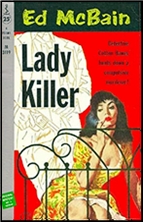
◠Faithfully adapted by John Hawkins from the 1958 novel, “Lady Killer†(10/9/61) introduces department psychiatrist Ben Daniels (Harlan Warde); Sam Grossman (Michael Fox), who runs the police laboratory; and his technician, Joe Richards (Dennis McCarthy). Taking a complaint, Kling barely notices when Frankie Annuci (Billy Hughes) — paid $2 by an unknown man — delivers a pasted-up note reading, “I will kill The Lady tonight at 8. What can you do about it?†Carella sees binoculars glinting from a roof across the street, so Bert slips out back to investigate, but is clouted before getting a good look at the perp.
Meyer learns that the purchaser of the dropped glasses may have lost them at the 708 Club, yet Frankie says he isn’t the man, and works with a sketch artist. Checking tenements, Meyer learns that the sketch may match tenant “Mr. Smith,†who fires on him and flees; he finds cards from the Jo-George diner, where George Ladonna (Peter Leeds) says partner Jo Cort (Lee Krieger) took a few days off. With George headed for drinks at 8:00 at the nearby 708, Carella remembers “la donna†is Italian for “the lady,†and they arrive just in time to save George, who loyally denied recognizing the sketch, thinking that Jo — jealous because his ex-girlfriend prefers George — was in routine trouble.
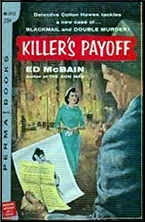
◠The first of Norman Katkov’s two adaptations, “Killer’s Payoff†(11/6/61) was based on McBain’s 1958 novel and directed by John Brahm, like Daugherty a mainstay of the Hitchcock series and Thriller. Slain blackmailer Hank Richards paid for an apartment for dancer Nancy Johnson (Beverly Garland), from whom Havilland gets his “client list.†Kling overhears ex-model Lucy Mencken (Jeanne Cooper), shielding her husband from racy photos, make a rendezvous with Hank’s would-be successor, but following her, Roger is pistol-whipped.
Havilland’s questioning provokes an angry visit in which Hank’s friend Marty Torr (Paul Richards) slaps Nancy around, admitting that he killed Hank and then followed the cops to identify his marks. He’s about to shoot Nancy when Roger calls to invite her to dinner, and her cleverly off-kilter reply cues him to go in with gun blazing. McBain’s far more convoluted solution involved a “conglomerate perp,†three hunters whom the blackmailer saw accidentally kill, and bury, a fourth; they joined forces to shoot him, and almost claim the life of the detective trying to trap them.
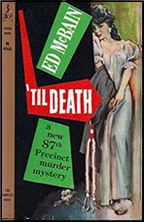
◠Adapting “’Til Death†(12/11/61) from McBain’s 1959 novel, Katkov turns Steve from an expectant father (of twins born on the last page) and the brother of bride Angela (Judi Meredith) into a family friend. Tommy Palmer (Darryl Hickman) and Angela receive deliveries containing, respectively, a black widow and condolence card. Marty Kellogg (Johnny Seven), who blamed Tommy for a buddy’s death in Korea, was just released from a veterans’ hospital, so Kling agrees to attend with his fiancée, Claire Townsend (Margie Regan), in tow.
Dancing with Angela at the reception, best man/long-ago beau Ben Darcy (Corey Allen) says it should have been theirs, and he’ll be there if anything happens to Tommy; overhearing, Steve confirms Ben’s handwriting on the delivery cards, which he says were jokes. Marty arrives, professing no hard feelings, but clocks Kling, who was searching for him, and attacks Tommy with a switchblade, stopped by Steve in the nick of time. Katkov streamlines McBain’s bizarre plot, putting commendable focus on emotions and relationships.
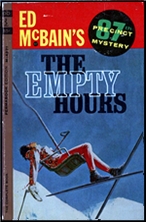
◠Richard Collins wrote three adptations, starting with “Empty Hours†(11/20/61), which was shorn of the initial article from a novella published in Ed McBain’s Mystery Book #1 (1960) and the titular 1962 collection. Claudia Davis drowns when Eric Blau (William Schallert) fires at her canoe on Triangle Lake, while onshore companion Josie Thompson (Patricia Crowley) — oblivious to the silenced shots — tries to save her. Penniless Josie, reported drowned, has her hair cut and dyed, telling fiancé George (Henry Brandt) that their uncanny resemblance will enable her to claim her best friend’s inheritance.
Blau’s employer says “Claudia†is writing checks that lead Steve and Bert to a witness, recompensed for workdays the inquest cost him, and a passport photographer; records also reveal a traffic violation. The embezzling executor asks “Claudia,†unseen since childhood, to refrain from drawing interest, citing an investment tip, and has Blau try again, but questioning a cabbie hired to drive “Claudia†— who didn’t know how — back to town tips off Carella and Kling in time to stop him. Inventing Blau, George, and the executor, Collins here takes the greatest liberties with McBain’s source, which opens with “Claudia†found strangled by a panicked burglar.
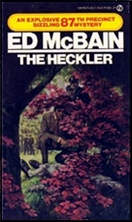
◠In “The Heckler†(12/18/61), Collins masterfully distills the 1960 novel introducing the precinct’s Moriarty, the Deaf Man, aka Sordo; with the iciness he later showed in Bullitt (1968), Robert Vaughn is perfect as the ruthless, methodical villain. His complex scheme involves death threats to a man whose loft is above the soon-to-relocate Mercantile State Bank, and to others located near lucrative businesses. Distracting the police with those and bombs made by night watchman “Pop†Smith (Frank Albertson), he hopes to heist more than $1 million from the the vault in the new location, under which he has tunneled during construction.
Learning that Pop concealed a fiancée, Sordo coldly shoots him, but a hotel matchbook found in his burned uniform leads to Lotte Constantine (Mary La Roche); Kling catches her retrieving love letters from his apartment and finds a bank floor plan before Sordo — who learned Pop copied it — bursts in to wound Bert. Sordo follows with the kidnapped Lotte while his henchmen take the loot to the ferry in an ice-cream truck. Disembarking after a family vacation, Meyer accosts the driver over a license-plate discrepancy, but timely warnings from his wife, Sarah (Ruth Storey), and Lotte allow him to disarm the thieves.
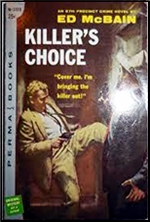
◠Scripted by Luther Davis and Collins, “Killer’s Choice†(3/5/62) was based on McBain’s 1957 novel, previously an episode of Kraft [Mystery] Theatre (6/11/58). That and another live Kraft entry — Larry Cohen’s original teleplay “87th Precinct†(6/25/58) — were the first attempt at a series, with several cast members in common; Cohen later wrote the telefilms Ice (1996), based on McBain’s 1983 novel, and Heatwave (1997), another original. Amy Boone (Gloria Talbott) is found shot dead in the liquor store where she worked for Franklin Phelps (R.G. Armstrong), with whom she was having an affair.
“It sounds like we’re talking about three different people,†Kling says when the squad compares accounts by her mother, ex-husband, and other “friendâ€; Mrs. Phelps is tricked into admitting she killed Amy, having slipped away from a Miami party and taken a round-trip flight to New York. In the novel, McBain introduced Det. Cotton Hawes and killed Havilland with the shards of a plate-glass window through which a perp pushed him, a B story incorporated into “New Man in the Precinct†(4/16/62), supplanting Havilland. (McBain’s Pusher afterword reveals he wanted Carella to succumb to gunshots there, but was dissuaded by his agent and editor.)
◠Written by Robert O’Brien and James Gunn, “New Man†finds Cotton (Fred Beir) filling in from the ritzier 30th for vacation-bound Det. Frank Kanin (Ray Montgomery), who meets the literary Havilland’s fate. He stops to help stricken Matt Murdock (Robert Colbert), winged by Dave Evans (Max Slaten) after breaking his jaw with a left hook in a liquor-store robbery; noticing the blood, Frank gets the same, hurled to his death. Carella checks out ex-pugs in trouble with the law, and Evans identifies Murdock, who persuades a doctor to remove the bullet, although daughter/nurse Linda Walters (Elizabeth Perry) warns it’s illegal not to report it.
Social Security leads Carella and Hawes to Murdock’s hotel, but Cotton naively knocks on the door, eliciting a hail of bullets that nearly kills Steve. His wound reopened, Murdock blackmails Linda into coming to his new digs to patch it up, with a penicillin chaser, yet when the clerk spots his newspaper photo and drops a dime, the syringe is found. Bluffed to believe her father’s prints are on it, Linda recalls Murdock’s unusual phraseology regarding his getaway, a trucking company’s marketing slogan; the squad apprehends him at the depot, and Hawes learns that Steve is not one to hold a grudge.
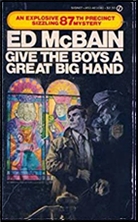
◠In “Give the Boys a Great Big Hand†(1/15/62), adapted by Shimon Wincelberg from McBain’s 1960 novel, a severed hand in a flight bag from Las Vegas sends Bert to Missing Persons, where he’s offered the file on stripper Barbara “Bubbles†Caesar as a diversion. Kling and Carella investigate merchant seaman Karl Andrade (Michael Forest), who stormed out on learning of Milly’s (Suzi Carnell) pregnancy. He got drunk, and a previous flame — whose photo Bert recognizes as Bubbles — called to say he was there, asleep, but Karl claims it’s all over between them.
Choreographer Warren Tudor (Barry Atwater) brought his “soul mate†from Vegas and hated the baser attentions she received at the club where drummer Mike is also missing; Karl wants her to convince Milly nothing happened, and sets up a meeting at Tudor’s, but it’s a trap. Carella and Kling arrive just in time to prevent Tudor from chopping off the hands that “defiled my love†with a sword, finding Barbara and a mutilated Mike, both killed when caught in flagrante delicto by Tudor, who deludes himself that she is still alive. Wincelberg ends on a more positive note with the Andrades reconciling, whereas McBain’s unsympathetic seaman, obsessed with Bubbles, planned to abscond with her.
— Copyright © 2023 by Matthew R. Bradley.
END OF PART ONE: TO BE CONTINUED …
January 14th, 2023 at 12:44 am
I have a fair memory of the title sequence and one or two episodes, one not covered here yet. Rowlands Teddy was handled well as part of plots but never descending into pseudo Mr. and Mrs. North.
I still have these actors in my head when I read the books to some extent.
The series also inspired a couple of issues of a comic book adaptation with art by Bernard Krigstein whose classic EC story “The Master Race” is one of the highlights of graphic storytelling.
January 14th, 2023 at 10:33 am
Wonderful survey. I was 11 when the series aired, and like David, I visualised Robert Lansing as Carella and Norman Fell as Meyer when I read the books later on. Those guest actors are a Who’s Who of TV regulars from the ’50s and ’60s. I checked IMDB to see if Nancy Davis in “King’s Ransom” was “the” Nancy Davis — yep.
January 14th, 2023 at 2:00 pm
Once again, Matthew, great work! I love it when scholars (and you surely are that) put their skills to work documenting, preserving and explicating blue collar ephemera from bygone eras. What you’re doing is redeeming something otherwise lost. And if the universe is contained in a grain of sand, then it too is contained in our ephemera.
Adorno once said that there is nothing more overvalued than today’s paper and nothing more undervalued than yesterday’s. Ezra Pound added that art is ‘news that stays news’ The degree to which past cultural ephemera remain meaningful to us today is art. And for too long we’ve preserved symphonies instead of folk songs; ‘literature’ instead of pulp. As such, our histories have ignored the histories experienced by everyday people.
Thanks for continuing the work of rescuing from oblivion the popular cultural artifacts of us common folk.
January 14th, 2023 at 5:54 pm
Amen to that, Tony, and I imagine that everyone who comes to this blog on a regular basis feels the same way.
Matthew sent me this post as one long article, but with suggestion that I could, if I wanted, break it up into two parts. I wish I didn’t have to, but at 5000 words it would have been the longest post ever on the blog, by far.
I also hope that by working with Matthew, maybe we can replace the paperback covers with scenes from the episodes themselves. That would be nice.
First things first, though, and that’s Part II, as soon as I can do it!
January 14th, 2023 at 6:58 pm
Thank you all so much for the kind words. As you may have guessed, I put a ton of time and effort into this, but welcomed and was repaid in full by an excuse to read the first 15 books in this outstanding series for the first time. (I think I’m ready for a breather now!)
Tony, you’ve no idea how gratified I am that you described me as a scholar. As a matter of fact, I reserve the term “scholarship” as my highest praise for this kind of work that I and so many others do.
Steve, thanks as always for giving my work such a handsome showcase. I’m afraid I have no more access than you do to scenes from the episodes, although frankly, I love having the write-ups accompanied by the paperback covers, since that only emphasizes the unusually close relationship of the series on page and screen.
January 16th, 2023 at 8:33 am
One useful fact–THE 57TH PRECINCT television series shared more than a director with THRILLER…both were Hubbell Robinson productions…had a similar look to them, as well.
We’ve been collecting folk songs rather vigorously for quite some time…some of our “classical” music is folk songs, after all, as any fan of “early music” might note, even before we reach the era of composers incorporating folk melodies and other aspects in their chamber and orchestral work, and a whole lot of sloppier musicology involved recording some commercial “pop” songs as sung by, for example, children who’d picked them up off the radio, as “folk” songs…slightly clueless and not a little condescending, much in the way “pulp” is constantly abused these days, to cover Everything Kewl (and, of course, infra dig).
January 16th, 2023 at 8:38 am
And, hey, I chopped thirty precincts off the tv series! Keypads can be your friends, but only after the first cup of java.
January 16th, 2023 at 10:56 am
Todd,
I agree that since the 20th century we’ve done a much better job collecting folk songs and folk literature. Part of that’s because of the invention of sound recording technology and cheaper and cheaper methods of proliferating the written word (here you and I are right now, communicating in writing to an unlimited number of possible readers without any production costs).
The reason most folks think that rock and roll started with Elvis and hardboiled writing with Hemingway is, to my mind, due more to recording technology and emerging markets for popular cultural consumption, than to the originality of elvis and hemingway. To me, elvis and hemingway, though expert practitioners, were mostly just grabbing at the zeitgeist that was already in the air.
Whereas cultural markets in the preceding centuries tended towards the highbrow. And what happened under the circus tents stayed under the tents.
January 16th, 2023 at 11:02 am
Thanks for this fine essay. I remember gobbling up the Signet reprints as they started appearing in the early 1970s. What a great series, and McBain’s handling of crime stories was so different from the Agatha Christie and Mickey Spillane novels I’d been reading before that. I haven’t seen the TV series, so I appreciate all the effort and details provided here. I also wasn’t aware of the Cop Hater, The Mugger, and The Pusher films, so I need to track those down.
January 17th, 2023 at 8:23 am
Todd: As you’ll see, I make the Hubbell Robinson connection in Part II, regarding the fine composers the two shows shared. And I’m sure my main man Gilbert Colon, the staunchest of pulp fans, will be gratified to see you leap to its defense.
Duane: I’ve yet to see those early McBain films myself, and hope someday to do page-to-screen comparisons of those and/or later efforts such as the McBain-scripted (as Evan Hunter) Fuzz.
Thank you both!
January 17th, 2023 at 3:53 pm
Ah, but Tony, the circuses had their traditions and culture as well, and only the ignorant would ever have credited Presley as Inventor Of Rock, or Hemingway of Hardboiled prose…contributors, of course. What gigs me are those who want to insist that only They can or could see the demotic forms of literary or all narrative art as Pulp, all-encompassing Pulp, which is as gross an oversimplification and distortion as any blanket hostility to popular forms (which, of course, have always included opera, for example), and usually a condescending snobbery of its own, self-congratulation of the rankest sort, often insisting (the cleverer adherents thus quietly, but still) that the artists involved clearly didn’t know what they themselves were doing.
January 17th, 2023 at 3:56 pm
Good to know, Matthew, and glad to see the series get some attention. Robinson was one of the Good Ones in early television in the US.
January 18th, 2023 at 10:10 pm
[…] In Part Two, I continue the episode-by-episode description of the 1961-62 television series, The 87th Precinct, based on the characters created by mystery writer Ed McBain in a long list of very popular police procedural novels. If you missed Part One, you can find it here. […]
January 20th, 2023 at 12:19 am
Thirteen comments? No way!